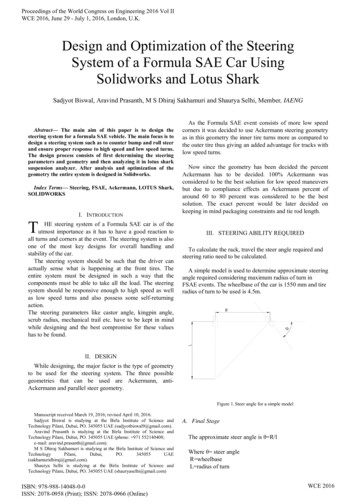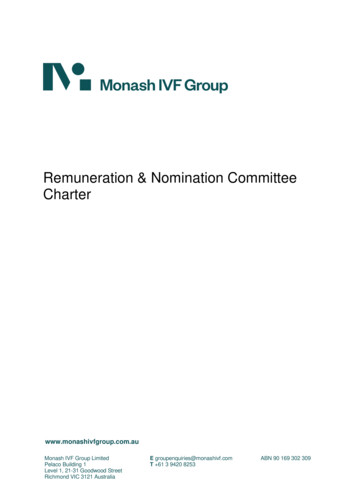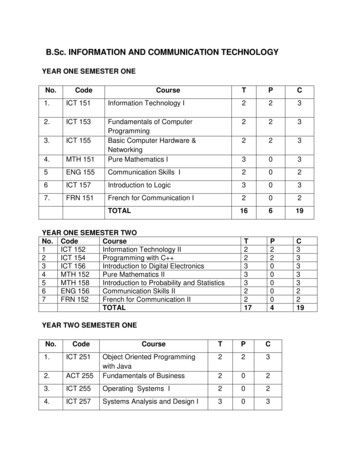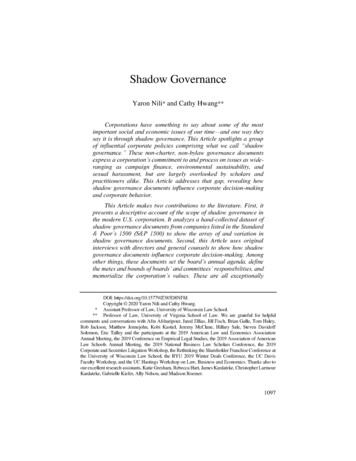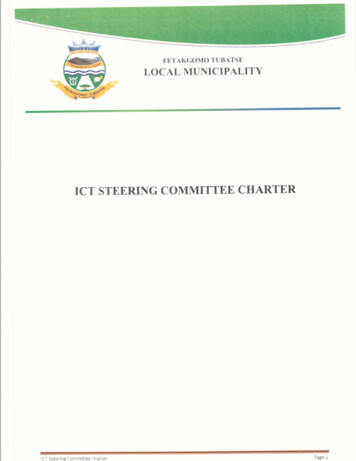
Transcription
FETAKGOMO TUBATSELOCAL MUNICIPALITYICT STEERING COMMITTEE CHARTERICT Steering Committee charterPage 1
TABLE OF CONTENT1Background31.1Purpose41.2Objectives42Role of ICT Steering committee members53Governance Structure63.1Composition of the committee63.2Committee membership formation64Meetings75Communication and Reporting76Conclusion8r-h rforPapp
BackgroundThe role of the ICT Steering Committee (the Committee) has evolved over timeand can no longer be ignored by Municipality since it has become critical thatmunicipality should focus on ICT Governance.The primary goals for ICT Governance is to assure that the investment in ICTgenerate business value and mitigate the risk that are associated with informationcommunication technology. In 2016, the revised King IV was released, the KingIV set out a number of key Governance principles under which ICT should conformand principles must be seen against legislative requirement contained in theMunicipal Finance management Act of 2003.Apart from the KING IV and being constituted under "Corporate Governance ofICT Police Framework", it is now also a requirement of the Auditor General thatan ICT Steering Committee exists within Municipalities and should therefore beacknowledged by Management or Council as the governing body for ICT withinthe Municipality. There are other various legislations that InformationCommunication Technology needs to adhere to: The Electronic CommunicationAct (ECA of 2005), Protection of Personal information Act of 2013,Telecommunications Act (TCA 1996), The Minimum Information SecurityStandards (MISS), and other Acts with reference to ICT, such as RICA, CPA 2009,ECTA 2002, etc.The establishment of an appropriate ICT Steering Committee will ensure that theapplication, management and review of the Municipal ICT strategies and plans areconsistent with the goals and the objectives of the Municipality and will ensure thatthe Municipality complies with the legislations since it is now a legal requirement.Enterprise Architecture is a discipline being pursue at a corporate level to supportthe goals of improving technology efficiency .Enterprise Architecture involvescapturing government business processes and technology currently adopted andproviding a blueprint for use of technology in new business initiatives and forassisting Information Technology strategies where greater efficiency andeffectiveness of technology is desired. Effective adoption of EnterpriseArchitecture will provide the ultimate benefit of reduced IT investment costs andIT recurrent costs to achieve specific business requirements and deliver improvedoverall business value from adoption of technology.Given the importance of architecture in delivering greater IT investment value, itis imperative that a governance process is established that will address Municipaland Corporate architectural issues and set architecture direction for projects. Thiswill ensure that broader Municipal benefits are attained and conflicting issues canbe resolved. Without this governance, architecture direction is driven from projectperspective with multiple technology complexity being the end results.Page 3
1.1 PurposeThe purpose of this Charter is to establish an ICT Steering committee as the policy-levelgroup responsible for providing leadership and direction in support of the office of theMunicipal Manager. The ICT Steering Committee's central focus is to provide theexecutive leadership for the coordination of ICT related activities between, among, andwithin the Municipality. The ICT steering committee shall also seek where feasible tosocieties and others to aid in the development and implementation. The steeringcommittee will:1.1.1Provide strategic leadership for Information Technology through the alignmentof IT Strategy plan and activities with municipality's vision and Objectives.1.1.2Prioritize Information Technology investment initiatives and deliver finalapprovals and recommendations on proceeding with proposed IT projects; andEnsure open communication between the IT Unit and the other functional unitsof the Fetakgomo Tubatse Local Municipality so as to promote collaborativeplanning.1.1.3The ICT Steering Committee shall provide an over side to the IT Projects, Itsbudget, or any other aspect of day-to-day IT operations.1.2Objectives1.2.1 The objective of the ICT Steering Committee shall include but notLimited to:a)Assists the Municipal Management in governing and overseeing themunicipality's ICT matters or activities.b)Assessing feasibility of IT Operation plans and providing requisiterecommendations to the municipality management about the benefit of theinstitution.c)Support the Municipal management by giving guidance and helping clarifypriorities on ICT related issues.d)Improving the quality, management and value of information, municipalitysystems, and information and communication technology.e)Ensure that decisions and actions are managed and implemented.2.ROLE OF ICT STEERING COMMITTEE MEMBERS2.1 The primary role of the Municipality's ICT Steering Committee is to:Page 4
2.1.1Develop corporate level ICT Strategy Plan that will ensure the costeffective application and management of ICT systems and resourcesthroughout the municipality.2.1.2Review current and future technologies to identify opportunities toincrease the efficiency of ICT resources in the municipality.2.1.3Monitor and evaluate ICT projects and achievements against the ICTStrategy Plan.2.1.4Provide advice and recommendations to the Accounting Officer andSenior Management Team on significant ICT issues.2.1.5 Report IT matters quarterly to Audit Committee in consultation withThe office of Accounting Officer.2.2Review and recommend the ICT major projects, major expenditure projectsPriorities to the accounting officer for endorsement.2.3Review the adequacy and allocation of ICT resources in terms of funding,Equipment's and service level agreements.2.4Monitoring progress and expenditures against major milestones andBudgets.2.5Evaluates the ICT performance, based on the various ICT reports provideAnd guide for solutions towards major risks, obstacles and issues.2.6Oversee the development, effectiveness and implementation of the ITStrategy Plan.3. GOVERNANCE STRUCTURES3.1 Composition of the Committee3.1.1ICT Steering committee is considered a permanent standingCommittee.3.1.2The committee is constituted by the members appointed by theMunicipal Manager (MM) and that he/she shall appoint a Chairpersonfrom amongst the appointed ICT steering Committee members, whomshould be at a director position within the municipality.3.1.3At least the two-third majority of Municipal departments shall berepresented.3.2Committee Membership Formation3.2.1 Membership of the ICT Steering Committee shall be comprised of the following:in tpprine Committee charterPage 5
RoleDesignationChairpersonDirectorManager: Infrastructure ServicesChief Town PlannerUsers RepresentationUsers RepresentationManager: BudgetAdvisorTraffic Management RepresentativeUsers RepresentationIDP ManagerAdvisorCommunication Unit RepresentativeUsers RepresentationChief Financial Officer or RepresentativeFinancial SponsorInformation Technology '.ManagerCoordinatorInternal Audit RepresentationAudit analystRisk Management RepresentationRisk IdentifierCoGHSTA RepresentationGovernment SupportPublic Participation: ManagerStrategic stakeholderIT OfficerSecretariatCommunity Services RepresentativeAdvisorCooperate Services RepresentativeAdvisor3.2.2 All permanent members of the ICT Steering committee should be veryFamiliar with the municipality ICT policies, procedures and practices.4MEETINGS4.1 ICT Steering Committee Meeting quorum:4.1.1 The ICTSC meeting shall be declared official only if the twothird majority members (7 1 members) have honoured themeeting.Page 6
4.1.2If any member is unable to attend the three consecutive meetings ofICTSC meetings without apology, the chairperson shall bring such tothe attention of the municipal manager. The municipal manager shalldesignate a replacement.4.1.3If the ICTSC chairperson is unable to attend the two consecutivemeetings of ICTSC meetings without apology, then the committee itselfshall bring such to the attention of the municipal manager. Themunicipal manager shall designate a replacement.4.1.4By invitation, all divisional managers and the internal audit personnelshall attend these meetings.4.1.5Ad hoc members, as required, who are experts of particular businessprocesses or technologies, will be invited to attend the meetings.4.2The Committee shall meet on a regular basis, at least once per quarter.These meetings shall be scheduled by the Committee Secretariat or designatedproxy.4.3At each meeting, the committee will receive progress reports on allpreviously approved proposals and current projects. The committee mayrecommend the termination of any IT project which may not meeting itsProjected goals in terms of performance standards to the office of MunicipalManager.5.COMMUNICATION AND REPORTING5.1. The ICT Steering Committee should report directly to the MunicipalManager and/ or The Municipal Audit committee;5.2 The ICT Steering Committee should provide advice to the MunicipalManager on significant ICT developments and issues regularly (to bespecified) and as requested;5.3A regular (to be specified) report of major issues and developmentsshould be prepared by the ICT Steering Committee Chairperson through ITdivision and submitted to the Municipal Audit committee;5.4The ICT Steering Committee Chairperson should submit and present proposed ICTstrategies and business cases (funding submissions) for all new ICTproject proposals to the Municipal Manager and Executive council forApproval.6.CONCLUSIONCoordination of IT investments and activities is essential in order toICT Steering Committee charterPage 7
eliminate duplication of effort and data, avoid redundant expenditure,reduce resources spent on unfunded mandates, leverage IT investments,accelerate the development of electronic government to meet the needsand expectations of citizens, and improve the efficiency and effectivenessof IT management hence an establishment of ICT Steering Committee.It is the responsibility of the Fetakgomo Tubatse management to ensure that thisCharter remains effective until amended or replaced.6.1 Charter reviewa. This Charter shall be reviewed 24 months after the day of approval.6.2 Implementationa) This Charter comes into effect from the date Accounting Officer approved.Acting Municipal ManagerDate:Page 8
ICT Steering Committee charter Page 1 ICT STEERING COMMITTEE CHARTER FETAKGOMO TUBATSE LOCAL MUNICIPALITY. r-h rforPapp . Without this governance, architecture direction is driven from project . eliminate duplication of effort and data, avoid redundant expenditure, reduce resources spent on unfunded mandates, leverage IT investments, .
